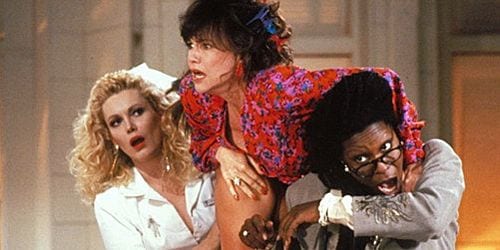
As long-running soaps disappear from the air or migrate online, it’s an odd (if not unwelcome) time to reissue the 1991 behind-the-soaps comedy Soapdish on home video. Even given the ostensible reason — the film’s 20th anniversary — Paramount’s release strategy is bizarre: rather than putting out a Blu-Ray version of the film and/or adding some special features, the studio has simply reissued the exact same DVD (not even yet out of print!) with uglier cover art and a sticker touting the 20th anniversary. Paramount upgraded initial bare-bones of other comedies like Airplane! and Clueless, but Michael Hoffman’s farce is afforded no such treatment, still bearing only the original trailer and a musty making-of featurette from the year of its release.
Too bad. Even if the movie’s plot engine is approaching time-capsule quality, Soapdish itself is an uncommonly well-executed farce. The film’s obvious but satisfying gimmick is that the set of the long-running soap opera The Sun Also Sets is a twisty soap opera unto itself, with a cast full of dark secrets and entanglements to match its characters. The center of both the show and the movie is Celeste Talbert (Sally Field), an aging actress convinced that some of her coworkers, including costar Montana Moorehead (Cathy Moriarty) and producer David Barnes (Robert Downey Jr.), are plotting against her.
Indeed, Montana and David are in cahoots: she wants Celeste off the show, and he wants to do whatever Montana asks in hopes of bedding her. To this end, they enlist washed-up Jeffrey Anderson (Kevin Kline) to return to the show, despite the fact that his character was long-ago dispatched via an offscreen beheading; he and Celeste are former lovers, of course, and quite despise one another. Celeste has also been keeping some key information from Jeffrey; the production is “crawling with subplots,” as mysterious ingénue Lori Craven (Elisabeth Shue) notes. It all culminates in an unlikely but extremely funny live broadcast of The Sun Also Sets, as the actors use their characters to sort out their problems.
Really, though, they do this throughout the movie, just as the actual actors use these characters to indulge in heedless screwball silliness. The plotting of Soapdish illustrates the thin line between soap and farce; its twists and revelations are accompanied by lots of entrances, exits, screaming, and pratfalls, which could add up to off-key camp if director Michael Hoffman didn’t show such command of his actors and material. Hoffman makes strong use of the depth of the physical depth of a soap opera set and surrounding studio, as the camera tracks characters, finds them in the background of other shots, and whips around the room with perfect timing. Was this a particularly ambitious technical undertaking for a comedy, or has studio farce-craft been in a precipitous decline since 1991?
The cast keeps up with Hoffman’s pacing, as well as a sharp script by Andrew Bergman and Robert Harling, none with more aplomb than Kevin Kline. Kline’s classical training has served him well in his unhinged yet precise comic roles, and as Jeffrey he has a particularly knowing command of an actor’s mix of vanity, pretension, and sputtering dramatics (maybe it helps that he actually did a brief stint on a soap in the seventies). Field, Moriarty, and Downey all have terrific moments (though Field appears to be working a little too hard on her crying jags, perhaps spoofing her own teary Oscar acceptance moment), but Kline makes every one of his scenes not just work, but sing – no one’s better at the poetry of ridiculousness. If the movie takes a little while to rev up, it’s because Kline is only onscreen for brief glimpses before he actually turns up on set around the forty-minute mark (although his early scenes playing Willy Loman to a dinner-theater audience in Florida are priceless).
Although the film’s milieu feels dated, especially the notion of glamorous soap stars that capture the public’s imagination, Soapdish maintains a certain amount of currency. At this point, celebrity culture has become its own soap opera, supplanting, to a large degree, the daily scripted version in favor of more efficient “real” versions. The genre has been divided in two: the reality soaps, with their time-killing anti-twists; and celebrity-centric tabloids, which essentially script their own twists and turns and apply them to famous faces against their will. The latter is not so different from the heightened melodrama played for laughs in the film.
A remake of Soapdish has been proposed; if it must proceed, celebrity tabloids would make more sense than reviving the idea of the country’s eyes fixing with such interest on one of the few remaining daytime soap operas (unless it’s a period piece). Moreover, though, it seems unlikely that a remake could match this film’s craft, which only looks easy and silly (well, okay, it is silly; gloriously so) — even on another bare-bones DVD.

![Call for Papers: All Things Reconsidered [MUSIC] May-August 2024](https://www.popmatters.com/wp-content/uploads/2024/04/all-things-reconsidered-call-music-may-2024-720x380.jpg)



